- Home
- Deborah Smith
A Place to Call Home Page 9
A Place to Call Home Read online
Page 9
“You know where Roanie Sullivan’s pay is headed, don’t you?” Aunt Irene demanded of Mama. She and Aunt Jane and Aunt Lucille were gathered on the front porch in rocking chairs, the aunts lined up on either side of Mama like sentries flanking a prisoner. I hid between the azalea shrubs and the jasmine trellis at one end of the porch, listening.
Roanie had been with us exactly one month. I couldn’t hang around with him. I couldn’t follow him all over the farm. He had work to do, and I had orders.
“He’s giving your good money to his old man,” Aunt Irene said, thumping her glass of bourbon on the arm of her rocker. “That’s the only reason Big Roan lets him stay here. To turn over the money.”
I thought of Mama’s older sisters as old, but they were only in their forties, prime, pretty, brown-haired Delaney women. They were small-town society queens, like Mama and Grandmother Elizabeth, very sure of their place in the world. Sure that Daddy had gone crazy and taken Mama along for the ride.
“Big Roan bought Daisy and Sally McClendon some new clothes,” Aunt Jane peeped. “Both of them. He’s fooling with both of those McClendon sisters. At the some time.” Aunt Jane was a small, twittery woman. I’d always known her to be open to new ideas and large thoughts. She ran the library with a magnanimous love for books and people who loved books. She’d introduced me to the fantastic worlds of C. S. Lewis. She let me check out more books than the limit. “Daisy came to clean house for Lilah Johnson yesterday, and she was wearing a new sweater, and she told Lilah her ‘man friend’ gave it to her.”
“Everybody knows Daisy’s still stewing around with Big Roan,” Aunt Lucille added helpfully. “And now with the extra money he’s getting from Roanie, he can keep Sally on his line, too. I’d bet you a dime that little boy of hers is his.”
“We all know who fathered that baby boy,” Mama said impatiently. “I’d do something about it if I thought it wouldn’t tear the family up. Get that baby. Raise him decently. He’s Pete’s son. We’re his aunts.”
“Marybeth, I swear I don’t see much that reminds me of Pete when I look at that baby.”
“You see Delaney bloodlines, if you look close.”
“Well, there’s no proof, and Sally won’t give him up, anyhow, and you’re right—no Delaney would set foot in this house again if you and Holt took in the baby. And you’d break Mawmaw’s heart. Good lord, you’ve caused enough gossip by taking in Roanie Sullivan.”
“Roanie’s a good boy. He can give his pay to his daddy if he wants to. In a way, I respect Roanie for that. Not deserting his daddy.”
Aunt Irene snorted. “You’re just supporting Big Roan’s whores.”
“No, we’re giving Roanie half a chance to make something of himself.”
“The boy’s a lost cause. Bad breeding. Bad influence. Lucille knows.”
I could see Aunt Lucille, who taught social studies at the high school, nodding. “Quiet as a clam. Careless hygiene. Barely gets by, gradeswise. Touchy. He’s got a junkyard-dog look in his eyes, Marybeth. Mark my words. He’ll slit somebody’s throat someday.”
“Well, I wouldn’t blame him if he did,” Mama retorted. Mama could change her tune when she was provoked. “He’s been treated like pond scum by this town for his whole pitiful life. We ought to be ashamed. If that chicken comes home to roost, it’ll be on all of our doorsteps.”
“Marybeth!” Aunt Jane chirped. “You’ve got to think about our Mawmaw!” As if she and the other sisters spent much time thinking about Grandmother Elizabeth, I fumed. They were usually glad to let Mama take care of her. “What if Roanie Sullivan knocks our Mawmaw in the head? Or does it to old Granny Maloney?”
“Then I’d have one less mean-tempered old lady to put up with.”
“Marybeth!”
“Oh, he’s not a thumper or a throat cutter,” Mama added with some disgust. “For goodness’ sake.”
Aunt Irene said sternly, “Holt’s gotten more than a few hard comments in town. They’ve been telling him to think twice about his good-hearted nonsense. Pete’s furious. He says he might as well turn over the key to the Auto Supply so Big Roan won’t have to break a window to rob it next time. He says at least he’ll know where to look for his merchandise.”
Mama snorted. “I bet Pete didn’t say that to Holt’s face.”
“Well, no, but—”
“Well, what about Dwayne?” Aunt Jane asked. “He’s hardly speaking to Holt. He says Rhonda still has nightmares about the Christmas parade.”
“Dwayne hardly speaks anyway,” Mama said. “If he didn’t have to talk to customers at the pharmacy, he wouldn’t talk at all.”
Aunt Lucille cleared her throat. “I have to tell you, Marybeth, I don’t want Violet visiting Claire over here, not with that Sullivan boy around. I don’t want her writing any pornographic poetry, if you know what I mean.”
There was an awkward silence. I bit my tongue. Violet was my best friend, a deceptively wispy little soldier who would go anywhere or try anything as long as I promised it wouldn’t get us in too much trouble.
“I don’t want my Aster around him, either,” Aunt Irene added with misty anger. “She nearly gave up the marching band after … well … the Christmas parade.”
“Claire had good intentions with that poem,” Mama said in a thready tone. “Just a bad choice of words.”
“Marybeth, be serious.” Aunt Lucille scowled and then was quiet. I felt disappointed in her. She looked stern and inflexible, her back straight as a fence pole in her tailored blue pantsuit with the bell-bottomed trousers.
“Marybeth, I’m all for Christian good works,” Aunt Lucille continued finally. “But the most Christian thing you and Holt could do for Roanie Sullivan would be to ask Bess to file an order for him with the courts. William would send him to a foster home for good. He’d be with his own kind. They’d keep him until he turned eighteen.”
I felt sick to my stomach. Oh, please. Mama and Daddy wouldn’t change their minds, would they?
“Ship him off?” Mama said evenly. “Turn him over to a bunch of strangers and let ’em lock him up in something no better than an orphanage for juvenile delinquents? There’s nothing Christian about that.”
Aunt Irene snapped, “You let ’em have him before. After that … that … after my poor parade—” Her voice broke and trailed off.
“We were wrong,” Mama said. “Now, listen, sisters. I’ve prayed and taken counsel from my inner voice—”
“Oh, Marybeth, sometimes you sound no better than a hippie!”
“My conscience,” Mama corrected. “And it tells me that Roanie has a good heart, and Holt thinks so, too. The boy works hard and learns fast. I say he’ll be just fine.”
I loved Mama for that, but I had a job to do. I pulled a long, fat lizard from the pocket of my overalls and set it on the porch’s edge. I’d dug it out of its bed under some leaves behind the calving barn. The cool October weather made it sleepy. The warmth of my pocket had charged it up. I blew on it and it scurried toward Aunt Jane’s tennis shoes.
Aunt Jane peeped loudly when it zipped over her toes.
Aunt Lucille shoved her chair back.
Mama raised her loafers and let it pass.
Aunt Irene stomped on it. “Got the little heathen,” she said.
I felt bad about that poor lizard for a long time.
• • •
I had to get some things straight between Roanie and me. In private. That was difficult to accomplish, since Daddy rarely let him out of his sight and swore that if he caught me alone with Roanie he’d hang me up by my heels until I turned the color of my hair.
He never did anything like that to me or anybody else, but my brothers and I were all sure he might.
We had ten farmhands, eleven once Roanie came to work for us. Daddy treated all of them the same—like privates in his own personal army.
In that pecking order, Roanie was a raw recruit still in boot camp. I had to make him go AWOL to talk to him.
&n
bsp; Roanie and Nat Former were in one of the chicken houses the next afternoon, shoveling litter from under the long rows of hen cages. Litter is a polite Southern name for the gooey grayish slop chickens contribute to the creation of fertilizer. The toilet aroma of two thousand well-fed hens will burn the hair out of your nose. But the strange thing is, if you grow up with it, as I did, the smell becomes familiar and pleasant. I shoveled my share of chicken litter.
I tromped up the center aisle of the chicken house, surrounded by a symphony of clucking, pooping hens in rows of cages, and halted before Roanie and Nat. They hoisted loaded shovels over the sides of a small tractor cart. Roanie’s jeans and old shirt were covered with the sweat-caked dust of dried chicken dung and the tall rubber workboots Hop had loaned him looked slimy. General Patton sat in a corner, wagging his curly tail. When Roanie saw me, he idly brushed a tiny white feather from his chin. I went, “Brrruck, cluck cluck,” and smiled at him.
His eyes gleamed. He seemed happy in all that chicken shit. It was a step up for him. He nodded but didn’t speak. I’m sure he was afraid to say a word to me until he had the rules down pat.
“Hi, Missy Claire,” Nat thundered, grinning. “What you want?” Nat was gap-toothed, skinny, and white-blond. He’d worked for us since he flunked out of school in the eighth grade and he was about thirty now. He had a slow smile and the brain to match. Not much of a threat.
“My mama wants Roanie to come to the house,” I lied smoothly. “She wants him to try on a pair of Josh’s coveralls.”
“Oh, me,” Nat said, frowning and shaking his head. “Mr. Holt told me to learn him this job.”
I squelched a laugh. Anyone but Nat could have qualified for a doctorate in shoveling in five minutes. “Okay.” I started to walk away. “I’ll go back and tell her you won’t let him go.”
“Oh, no! No, that ain’t right! But … but you have to ask Mr. Holt. Or your grandpa. Or somebody. Not me.”
“Everybody’s out in the back fields except you.” I sighed. “I’ll just go tell Mama that you don’t want to do what she said.”
“No, no, no!” Nat grabbed Roanie’s shovel. “You go on, Roanie. But come right back. Come right back.”
“I will,” Roanie answered, eyeing me with a slight, puzzled scowl.
I whistled under my breath as we left the chicken house. I’d shoved my long hair under a baseball cap. I had no breasts or any hint they’d rise anytime soon, so I thought I looked outstandingly boyish in a floppy gray sweatshirt, baggy jeans, and dirty tennis shoes.
Roanie measured his long strides to my short, swaggering ones but stayed a half-step behind. “What are you doing?” I demanded.
“Keepin’ my distance. Tryin’ to figure out if you made up a story to get me out of there. I don’t want to get in no trouble.”
“Made up a story? Boy, are you suspicious.”
“I’m an expert on liars. I know when I hear one.”
“Then why’d you come with me?”
“Why’d you ask me to?”
“I don’t know. I don’t speak to boys. Waste of time.”
“What am I, huh?”
“Oh. Oh, shut up.”
He halted. “I gotta get back to work. Don’t make up little-girl games no more. I ain’t no little boy, and this ain’t no game to me.”
“Wait! I’ve got to ask you something.” I looked at him hesitantly. “Do you … do you give your money to your daddy so he can spend it on whores?”
His face darkened. He looked away. “I give him money and he goes off to spend it. I get left alone. That’s how I want it.”
“But it’s not fair.”
“I like it here. Don’t care what it takes to stay.”
“But it’s your money. You could buy things you’ve always wanted.”
“I already did. In a way.”
“What?”
He looked at me for a long minute. Just looked. Then his gaze moved over the hills, the wooded mountains behind them, the wide, clear blue sky, our grand old house and the oaks and flower beds and fields and outbuildings connected by fine gravel roads—all of it—until, full circle, he came back to me. “I like it here,” he repeated.
“Okay.” I thought for a moment, then pulled a moist wad of tobacco from my back pocket. “Want a chew?”
He bit his lower lip and squinted at me. “Nooo.”
“Well, I do. Josh taught me. Him and Brady do it. So do Evan and Hop. Me, too. All the time.” Lies, lies, and damn lies. Josh had let me try a chew once, and I’d spent the next two hours rinsing my mouth out.
“Go ahead,” Roanie said.
I gnawed off a large, nasty bite and tucked it inside one cheek. The acrid juice immediately seeped over my tongue and I thought I’d gag. I launched into a long, rambling monologue about my non-girl exploits. The pet grass snake I’d had until it slithered out of its mason-jar home and nested in one of Great-Gran’s bedroom shoes. My status as a substitute catcher for my brothers’ pitching practice. The fact that I’d clipped the hair off two Barbie dolls to see if it’d grow back. Things like that.
“Yeah,” he said slowly, studying me as if I’d lost my mind.
“So don’t go treating me like some kind of girl.” I accidentally swallowed some juice. My stomach lurched. “You’ll just get laughed at.”
“Well, I’ll tell you somethin’, Claire. I can’t treat you like no boy.”
I liked it when he spoke my name. It gave me a fluttery feeling. Or maybe that was the tobacco. “Why not? You scared to?”
“Nooo. I just like things the way they are.”
I glared up at him. “You treat me like a girl and I’ll laugh at you.”
His face became somber. “Don’t do it. You ain’t like nobody else.”
My heart melted. “Okay, I won’t laugh at you. But I—I go anywhere I want to around here, and I don’t want Mama coopin’ me up because she’s scared.”
“What’s that supposed to mean?”
I rolled my eyes. “Oh, she’s just a worrier. But I know you’re not gonna grab me or knock me in the head or something.”
He went as still as a statue. “She thinks I would?”
I inhaled sharply and choked on tobacco juice. “Uh, no. No, no, she just—”
“I ain’t ever hurt a girl,” he said furiously. “I ain’t ever done nothin’ to a girl. I don’t want no girls hangin’ on me. I ain’t gonna end up bein’ a daddy to babies I don’t even want to take care of. Somebody sticks you with a baby, you gotta do the right thing. Any man don’t do right by a baby, he’s not worth spit.”
“You’re talkin’ about my Uncle Pete,” I said slowly. “That’s what you mean, isn’t it? It’s true. Sally McClendon’s baby belongs to him.”
He was silent. His jaw worked. Then he said, “I’m talkin’ about any so-and-so that lets a baby grow up without a good daddy. Hey. I ain’t the kind your mama ought to worry about. Go on now. Go back to the house ’fore somebody catches us and thinks ol’ nasty Roanie Sullivan’s fixin’ to eat you alive.”
“Oh, shitfire,” I said. I marched away a couple of steps and hiked up the legs of my jeans a couple of inches and spit a stream of tobacco juice to prove I could do it.
Don’t ever try to spit tobacco juice when you’re upset. Inhaling and spitting are mutually exclusive. It felt as if the whole wad went down my windpipe and got stuck there. I gagged and choked, clutching my throat, struggling to breathe. I thumped my chest. Watery goo spewed from my nose and mouth. But no tobacco.
“Take a breath!” Roanie yelled.
Well, I would have, if it had been that simple. Bright firefly lights speckled my vision, and I sank to my knees. Something hit me hard between the shoulder blades. Roanie stood over me, one hand drawn back. “Breathe!” he ordered hoarsely.
I tried frantically, shaking my head.
Roanie picked me up and ran toward the house, me kicking and flailing in agony. When he reached the edge of the backyard, we both fell sprawling on the
lawn. Mama and Grandma Dottie ran out. Grandmother Elizabeth and Great-Gran Alice peered excitedly from the back windows. Anyone might have misinterpreted the sight of Roanie Sullivan covered in chicken litter and pounding my back except he hit me one more time, knocked me flat, and the clump of tobacco popped out. I sucked in deep gulps of air.
“Undo her jeans!” Grandma ordered. “Get some air into her belly! She’s purple!”
Mama dropped beside me, rolled me over, and yanked at the fastenings. The next thing I knew, Roanie jerked my jeans over my shoes and flung them—and my tennis shoes—behind him.
Total humiliation. I lay there in a sweatshirt and pink panties. Roanie turned his back.
He, undoubtedly, was a gentleman.
And I, undoubtedly, was not.
Mama sagged. “Where did you get that tobacco?” she demanded.
I coughed and gasped. “From H-Hop’s dresser drawer.”
Roanie pushed himself to his feet and said with his back still turned, “ ’Less you need me to do something, I’ll go on back to work, Miz Maloney.”
“Hold on.” Mama flipped a dishrag over my panties and went to him. “What were you doing out here when you were supposed to be working?”
“I just … just come outside for a minute.”
“Then you can just come in the house and wait for Mr. Maloney. Explain to him why you can’t follow simple instructions.”
“Mama,” I tried, my head and stomach reeling, “Mama, it was my—”
“Be quiet, young lady. You’re in enough trouble.”
I began to cry, small, choking sobs of frustration. It was all my fault.
Nat, drawn by the noise, hovered a few yards away, shifting from one foot to the other and shaking his head. “I’m sorry, Miz Maloney, I shoulda gone with her to get them coveralls for Roanie.”
Mama looked at me shrewdly. “I see,” she said. She marched Roanie and me indoors.
Still woozy, I lay on the living-room couch with an afghan over my legs, and Roanie sat gingerly on the edge of a straight-backed cane chair beside the piano, moving his big-boned bare feet occasionally, as if the softness of the Oriental rug beneath them was a remarkable sensation. Mama had made him leave his dirty galoshes on the back porch.

 Legends
Legends Hold on Tight
Hold on Tight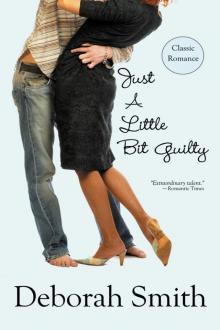 Just a Little Bit Guilty
Just a Little Bit Guilty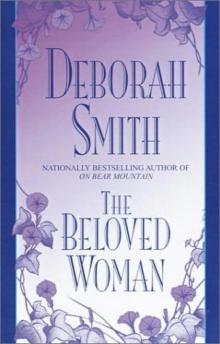 The Beloved Woman
The Beloved Woman Alice At Heart
Alice At Heart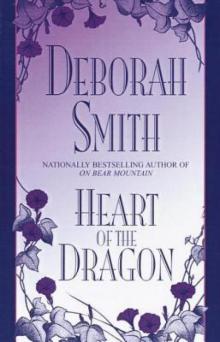 Heart of the Dragon
Heart of the Dragon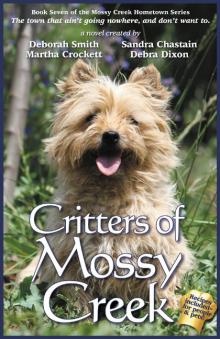 Critters of Mossy Creek
Critters of Mossy Creek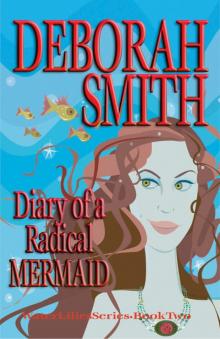 Diary of a Radical Mermaid
Diary of a Radical Mermaid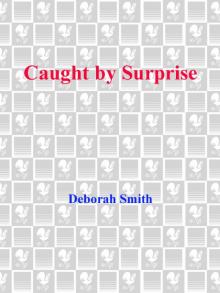 Caught by Surprise
Caught by Surprise Stranger in Camelot
Stranger in Camelot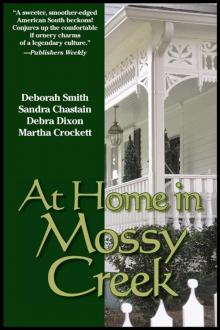 At Home in Mossy Creek
At Home in Mossy Creek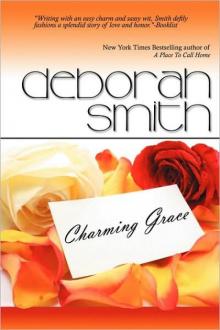 Charming Grace
Charming Grace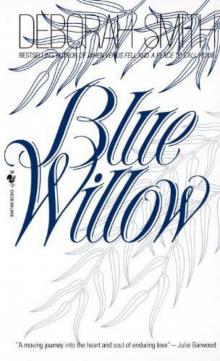 Blue Willow
Blue Willow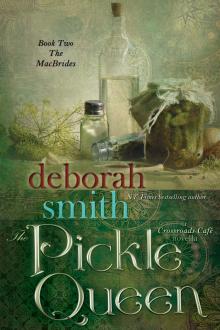 The Pickle Queen: A Crossroads Café Novella
The Pickle Queen: A Crossroads Café Novella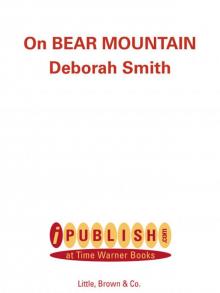 On Bear Mountain
On Bear Mountain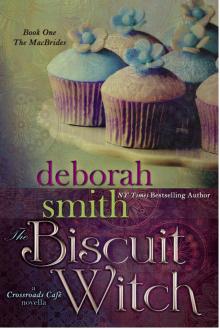 The Biscuit Witch
The Biscuit Witch Sara's Surprise
Sara's Surprise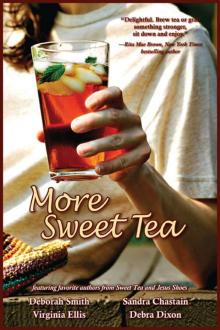 More Sweet Tea
More Sweet Tea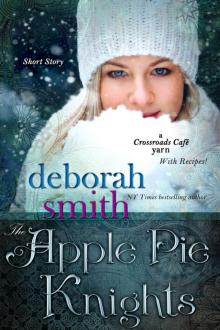 The Apple Pie Knights
The Apple Pie Knights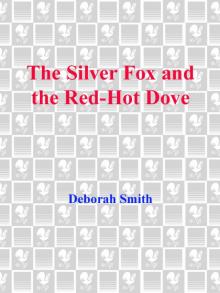 The Silver Fox and the Red-Hot Dove
The Silver Fox and the Red-Hot Dove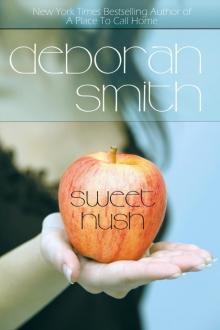 Sweet Hush
Sweet Hush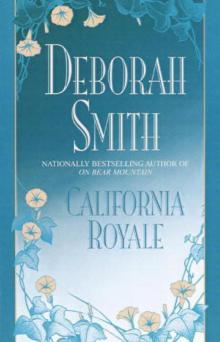 California Royale
California Royale Hot Touch
Hot Touch Miracle
Miracle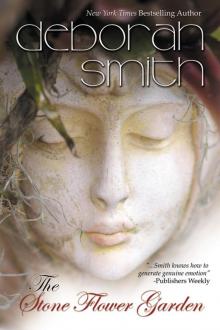 The Stone Flower Garden
The Stone Flower Garden A Place to Call Home
A Place to Call Home Silk and Stone
Silk and Stone Honey and Smoke
Honey and Smoke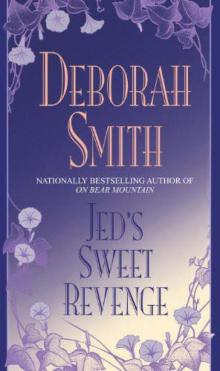 Jed's Sweet Revenge
Jed's Sweet Revenge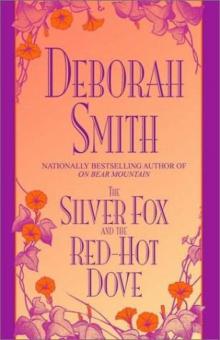 Silver Fox and Red Hot Dove
Silver Fox and Red Hot Dove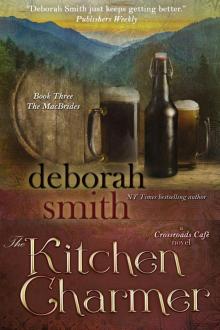 The Kitchen Charmer
The Kitchen Charmer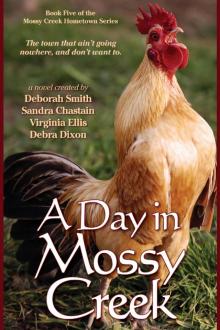 A Day in Mossy Creek
A Day in Mossy Creek Never Let Go
Never Let Go Summer in Mossy Creek
Summer in Mossy Creek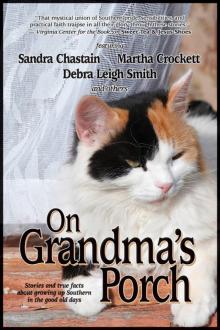 On Grandma's Porch
On Grandma's Porch The Crossroads Cafe
The Crossroads Cafe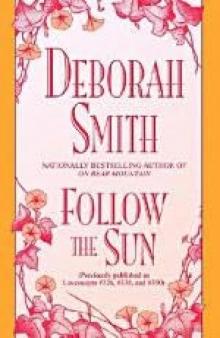 Follow the Sun
Follow the Sun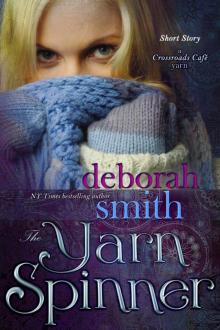 The Yarn Spinner
The Yarn Spinner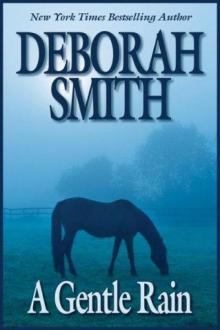 A Gentle Rain
A Gentle Rain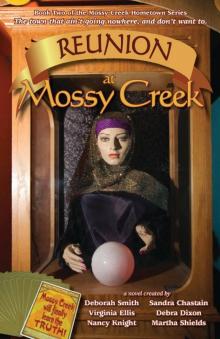 Reunion at Mossy Creek
Reunion at Mossy Creek